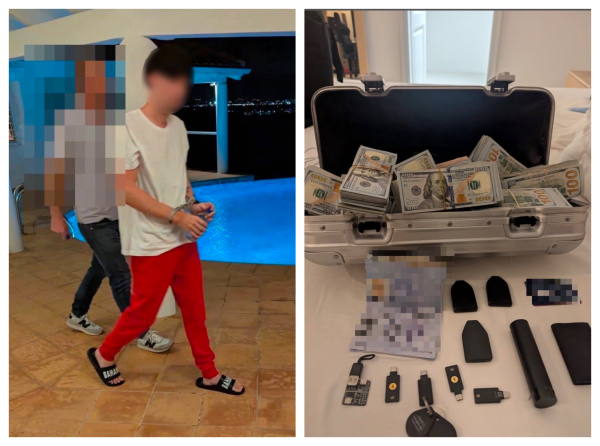 SAINT MARTIN:--- The U.S. Marshals Service is at the center of a significant investigation following the alleged theft of nearly $25 million in cryptocurrency from wallets under its control. The case has raised serious questions about the security and oversight of digital assets seized by the government, especially after reports surfaced suggesting a potential insider connection involving the son of a federal subcontractor.
SAINT MARTIN:--- The U.S. Marshals Service is at the center of a significant investigation following the alleged theft of nearly $25 million in cryptocurrency from wallets under its control. The case has raised serious questions about the security and oversight of digital assets seized by the government, especially after reports surfaced suggesting a potential insider connection involving the son of a federal subcontractor.
This developing story involves a government contractor, a blockchain sleuth, and a brazen display of wealth on social media that may have unraveled the entire scheme. We will explore the key players, the timeline of events, and the broader implications for how the U.S. government manages its growing crypto holdings.
The Allegations: An Insider's Betrayal?
The controversy began when approximately $24.9 million worth of cryptocurrency vanished from digital wallets managed by the U.S. Marshals Service. While hacks are not uncommon in the crypto space, this incident drew immediate scrutiny due to the sensitive nature of the assets—funds seized during federal law enforcement operations.
The situation escalated when prominent on-chain investigator ZachXBT, known for unmasking crypto-related wrongdoing, published findings pointing to a man named John Daghita. According to ZachXBT's research, Daghita had inadvertently revealed his control over the stolen funds during a dispute on the messaging app Telegram. In an attempt to prove his wealth, Daghita allegedly shared his screen, displaying a crypto wallet containing millions of dollars that were later traced back to the government's compromised wallets.
The most troubling aspect of the allegation is Daghita's family connection. He is reportedly the son of Dean Daghita, the CEO of Command Services and Support (CMDSS), a Virginia-based firm. This connection immediately suggested that the theft may have been an inside job.
CMDSS and the Government Contract
In 2024, the U.S. Marshals Service awarded a $4 million contract to CMDSS. The firm's role was to assist the agency, which serves as the primary custodian for the U.S. Bitcoin Reserve, with the management and sale of certain types of seized cryptocurrencies. This responsibility would have likely given CMDSS personnel, and potentially their close associates, access to or knowledge of the private keys and security protocols for government-controlled crypto wallets.
The contract awarded to CMDSS was not without controversy from the start. Competing firms challenged the decision, claiming CMDSS lacked the necessary credentials from the Securities and Exchange Commission (SEC). They also raised concerns about a potential conflict of interest due to the company's employment of a former U.S. Marshals Service staffer. However, the Government Accountability Office reviewed the complaints and ultimately concluded that the contract was not improperly awarded.
Following the theft allegations, both CMDSS and the U.S. Marshals Service have faced renewed pressure. The public affairs chief for the Marshals Service confirmed that an investigation is underway but has provided few additional details, leaving questions about whether the agency is still working with CMDSS.
ZachXBT's Role in Uncovering the Trail
The breakthrough in the case came from the meticulous work of blockchain investigator ZachXBT. By analyzing public blockchain data, he traced the flow of the stolen funds. The investigation gained significant traction after Daghita, who reportedly uses the online alias "Lick," was recorded boasting about his crypto holdings in a Telegram group.
During the recorded exchange, Daghita allegedly displayed a wallet holding millions in crypto assets. ZachXBT captured this evidence and cross-referenced the wallet addresses with the funds stolen from the government. The analysis revealed a direct link, connecting at least a portion of the funds Daghita controlled to the $24.9 million theft from the Marshals Service. ZachXBT’s findings, which he reported to authorities, provided a critical lead in an otherwise complex case.
Arrest and Ongoing Investigation
The digital trail eventually led to physical consequences. On March 5, 2026, news broke that John Daghita had been arrested by the FBI in connection with the theft, with his detention taking place on the island of St. Martin. This international arrest underscores the investigation's magnitude and reach. While specific charges have not yet been made public, the arrest marks a major development in the high-profile case.
The investigation is ongoing, and authorities are likely working to recover the stolen assets and determine the full extent of the security breach. The central question remains: how did the perpetrator gain access to the government's wallets? Investigators will need to determine whether an insider provided direct access to private keys or whether a vulnerability in the subcontractor's security procedures was exploited.
Implications for Government Crypto Oversight
This incident highlights the immense challenges government agencies face when managing seized digital assets. Unlike traditional assets like cash or property, cryptocurrencies require sophisticated technical expertise to secure. Private keys, the digital equivalent of a password and a signature, must be protected at all costs. If a key is compromised, the funds can be moved instantly and irreversibly.
The alleged involvement of a subcontractor’s relative raises critical concerns about vetting processes and third-party risk management. As federal agencies seize larger amounts of cryptocurrency from criminal enterprises, the need for robust, multi-layered security protocols becomes paramount. This case will likely serve as a catalyst for a thorough review of how government bodies secure their digital asset holdings and manage relationships with external contractors. The outcome could shape federal policy on crypto custody for years to come.






 PHILIPSBURG:-- As the island prepares for its 55th Carnival anniversary, Member of Parliament Ardwell Irion has officially unveiled a state-of-the-art digital platform,
PHILIPSBURG:-- As the island prepares for its 55th Carnival anniversary, Member of Parliament Ardwell Irion has officially unveiled a state-of-the-art digital platform, 




